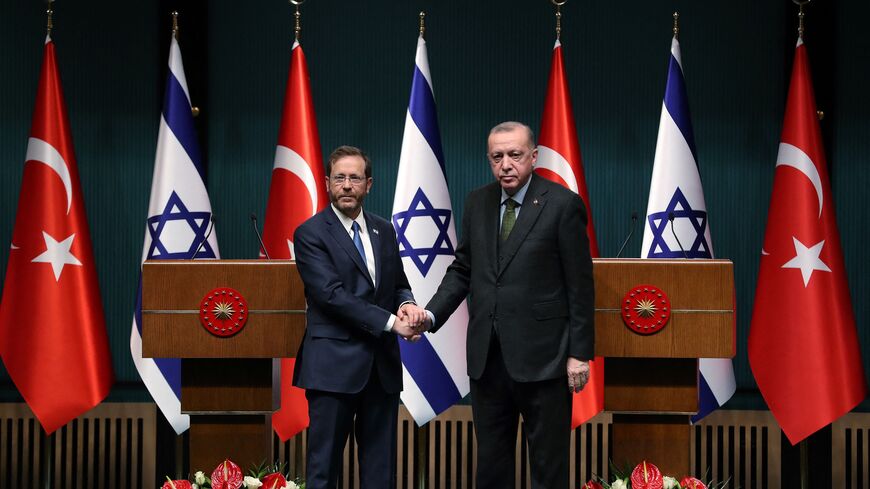Israel’s President Isaac Herzog and Prime Minister Benjamin Netanyahu were quick to call Turkish President Recep Tayyip Erdogan on Monday, to congratulate him on his electoral victory, expressing their hope for further deepening relations between the two countries. The calls from Israel were ahead of Washington and some European capitals.
Since his nomination, Herzog has played a key role in the rehabilitation of bilateral relations. In fact, Erdogan had called Herzog to congratulate him on his nomination in July 2021, marking an important step in restoring ties between Israel and Turkey. Herzog traveled to Turkey in March 2022 on a first official visit of an Israeli president in over a decade.
A statement issued by Herzog’s office on Monday said the Israeli and Turkish presidents spoke about “the importance of working together to protect stability, advancing regional peace and deepening the fruitful cooperation between the two countries.” Both leaders expressed their hope that they will meet soon, the statement read.
A statement issued by Netanyahu’s office said that the two leaders had agreed to continue strengthening bilateral relations and “bring them to new heights.” Erdogan thanked Israel again for its search and rescue assistance after the earthquake that struck Turkey in February. Netanyahu reiterated his commitment to expand Israel’s peace circle and deepen ties with Turkey.
Common ground on Azerbaijan
Erdogan has been personally invested and committed to rehabilitating ties with Israel. Following skirmishes between Israelis and Palestinians over the past few months, including tensions on the Temple Mount, Turkey issued rather moderate declarations, compared with past years. Israeli tourism to Turkey has resumed in the past two years after several years of cooling off.
According to the United Nations Comtrade database on international trade, trade between Turkey and Israel topped $9 billion in 2022. Turkey’s exports to Israel amounted to $7.03 billion and Israel’s export to Turkey reached $2.36 billion.
Tourism also rose to an all-time high record in the first nine months of 2022. All in all, 632,000 Israelis visited Turkey in the period between January and September, an increase of 448% compared to the previous year.
In parallel, Turkey has been apprehensive over the close energy ties between Israel, Greece and Cyprus, especially concerning the project of the EastMed pipeline that should export Israeli/Egyptian-liquefied gas from the region to Europe. Israel and Turkey have discussed in recent months also the idea of an Israel-Turkey natural gas pipeline, though feasibility for such a project to be carried out seems to be extremely low for a variety of reasons.
The large Israeli rescue delegation to Turkey after the earthquake also reflected the strong bilateral bonds. Erdogan awarded Col. (Res.) Golan Vach, who led the Israel Defense Forces search and rescue teams in Turkey, with a certificate of appreciation on April 25.
Israeli officials were careful not to comment on bilateral relations during the election campaign in Turkey, so as not to turn ties between the two countries into an electoral issue. Over the years, Turkey’s opposition candidate Kemal Kilicdaroglu made several statements supporting the Palestinians and against Israel. Still, Israel assessed that if he would win, Kilicdaroglu would not go back on normalizing ties with Israel.
The Palestinians for their part, have been wary over rapprochement between Israel and Turkey, even though Ankara had stressed that the rehabilitation of ties will not diminish its commitment to the Palestinian cause. Palestinian President Mahmoud Abbas had visited Turkey last August. Abbas was also quick to congratulate Erdogan on Monday over his electoral win. In his message to Erdogan, Abbas emphasized the "historic relations of brotherhood and solidarity unifying the two peoples."
That being said, with Erdogan’s victory, Israel now hopes not only to preserve the rehabilitation of ties, but to deepen them in a variety of fields, especially in trade and tourism. Israel would welcome a visit by Erdogan, though such a trip is apparently not in the cards in the near future. Another possibility is a meeting between Netanyahu and Erdogan somewhere else — perhaps on the margins of the United Nations General Assembly in New York in September.
On the regional level, Erdogan is expected to further nurture ties with Gulf countries, to ensure the continued flow of their financial and economic support to cash-strapped Turkey. As such, the restoration of ties between Israel and Turkey fits well with the US-mediated Abraham Accords between Israel, Bahrain, the United Arab Emirates and Morocco, and with Israel’s desire to deepen and expand these accords.
On the other hand, Erdogan invested much effort recently in rehabilitating ties with Damascus to resolve the Syrian refugee problem. These efforts involved high-level contacts also with Iran and Russia, such as the May 10 meeting in Moscow of the foreign ministers of Russia, Syria, Turkey and Iran. Israel is concerned over growing security ties between Russia and Iran. It is not interested in seeing Turkey becoming part of such an axis.
Curbing Tehran’s growing regional influence is a main issue during the visit of Herzog on Tuesday to Azerbaijan, an especially close ally of Turkey and also a neighbor of Iran.
Herzog spoke to reporters before departing for Baku. “Azerbaijan is a neighbor of Iran, a destabilizing force in the region seeking to undermine Israeli alliances of peace and security in the region. [Azerbaijan] is a friendly state, a key state with a lot of areas of cooperation,” he said.








